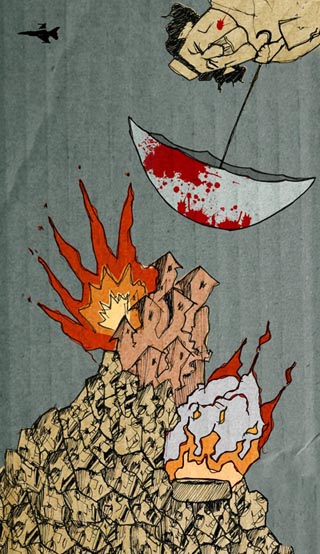Editor’s note: This article was written before Saif al-Arab Gaddafi, the youngest son of Libyan dictator Muammar Gaddafi, was reported killed in a Nato air strike on April 30, 2011. Three of the elder Gaddifi’s grandchildren were also reported killed by the strike on the family compound in Tripoli.
As Canada enters the final days in 2011 election campaigning, politicians streaking across the country have offered little more than resounding silence on Canada’s military role in Libya.
Days prior to the 2011 election launch, politicians in Ottawa voted en-masse to join the NATO-led military intervention in Libya, across party lines zero clear objections pronounced, unanimous approval.
Opposition parties did vocalized reservations while ultimately moving to back the Libya-bombing resolution, empowering Canada’s tittering, trigger-happy Conservative minority to forcefully join the Mediterranean bombing campaign via the use of CF-18 fighter jets.
Canada’s role in Libya is major, a military operation currently involving 15 aircraft, one warship, more than 500 military personnel, special military forces and a NATO commander.
As air raids hit the Libyan capital Tripoli, knocking two national T.V. networks off air, admits growing reports of civilian casualties, now is certainly the time to sound the alarm on Canada’s role in the bombing campaign.
Extending beyond parameters of the UN Security Council resolution backing a “no-fly” zone in Libya, NATO bombing raids on downtown Tripoli point to a clear escalation. As government buildings are blasted, including a reception hall area that Gaddafi utilized to host an African Union peace delegation only weeks ago, a clear priority for military violence over diplomacy is asserted.
Italy’s announcement on the deployment of military jets for “targeted action” in Libya, will certainly boost attempts by the fragile Gaddafi regime to paint the contemporary civil war in colonial terms.
100 years ago, Italian military forces dropped one of the world’s first recorded aerial bombs over Libya in the lead-up to WW1, launching a decades-long Italian conquest of the country, resulting in barbed-wire prisoner camps, mass detention and countless thousands dead — a colonial horror etched into Libya’s living history.
Extending from history into the present, as reports from Amnesty International point to a hike in violence in the recent weeks, difficult questions on the rush to military intervention and NATO’s role in intensifying violence in Libya need focus.
In Canada, all major political leaders supporting military intervention in Libya need to face increasing scrutiny in the election campaign, as horrifying reports of violence in Libya surface daily.
Certainly Libya’s dictatorial regime, lead by Gaddafi, is carrying out war crimes against opposition forces throughout the country, including the current siege on the rebel held city of Misrata in western Libya.
However key questions remain on the long-term political intentions of NATO-led forces bombing in Libya, a campaign driven-by military powers sustaining military occupations in both Iraq and Afghanistan.
Afghan activist Malalai Joya recently appealed for an immediate end to NATO’s military occupation in Afghanistan, describing U.S. and Canadian forces as “doubling our miseries, creating more obstacles, problems for the justice-loving, democratic-minded parties that we have, intellectuals, innocent people of my country.”
Revolution in Libya, rooted in justice and peace, will certainly will not emerge under the ashes of Canadian-backed NATO missile strikes.
Stefan Christoff is a Montreal-based community activist, musician and writer who contributes to rabble.ca. Stefan is on Twitter.



